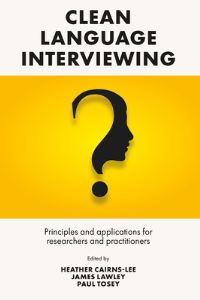The question of whether we want agency over our inner signals arose in a recent supervision session. The coach presented a case where a client felt stuck and unable to decide what to do. During the Symbolic Modelling session they realised that in the past they needed space to think about options, and then somehow a match is struck and that’s when they suddenly feel they can select one idea and go do it. The coach had nicely modelled that a key word was “somehow”, implying the client didn’t know how the match got struck.
As is common, the client wanted to be able to light the match whenever they wanted. This would mean they need not experience the difficult feelings of being stuck prior to knowing which idea to select. The coach interpreted this as the client wanting “agency” over the striking of the match.
The coach neatly identified this desire as an example of what Penny Tompkins and I have called a “faux outcome” since, according to our PRO model, these desires can either be regarded as a Remedy disguised as a desired Outcome, or a mixture of Remedy and desired Outcome, which Sharon Small has nicely labelled a “RemdO”.In this case, the desired Outcome “to light the match whenever I want” was (partly) motivated by the desire to avoid difficult feelings (a Remedy). Let me clear, there is no judgement involved in this coding. I have yet to meet anyone who, at times, didn’t seek to avoid difficult feelings. It appears to be a universal trait of humans, and possibly all organisms. All this classification is doing is highlighting that we can have experiences which are neither ‘pure’ desired Outcomes or ‘pure’ Remedies but somewhere in between.
I suggested to the coach that the match being stuck (by some unknown process/agent) can be regarded as a signal from the client’s system that they are ready to move from “think about” to “select and do”.
These kinds of signals generally have a short duration (e.g. “suddenly” in the above example), they don’t last long. They may appear to be digital (either on or off, there or not there) but mostly they are analogue, they have a range of values which can increase or decrease along a scale. For example, everyone I have spoken to about ‘burnout’ says that on reflection there were signals early on which they ignored or overrode – until they collapsed (i.e. the you’re-overworking signal was finally strong enough to get their attention).
This prompted the questions: (a) can we have agency over inner signals that are created out of our awareness?; and (b) if we can, does it add value?
‘Agency’ is the capacity to have an effect. It generally means the potential to act consciously to influence ourselves, another or the world. Agency isn’t something that can be seen or measured directly. Instead we know it through its effect, i.e. through feedback from how the world reacts to us. As a result, we form a perception of our (and others’) agency in particular contexts. For example, how much agency do you think you have, say, in relation to the health of your body?
So let’s image the client in the example gets what he wanted, the ability to strike the match at will. What are the likely consequences?
Firstly, if the client stops using the unconscious signal of ‘knowing when’, then they need to have some other way of knowing when to strike the match. Likely that will be when the difficult feelings get to a certain intensity. In other words, the difficult feelings now become the signal to strike the match. Since ‘difficult feelings’ usually arrive unbidden, the client will have swapped one signal from his unconscious for another. Moreover, the signal will have switched from ‘being ready to select’ to ‘feeling bad enough’. There are at least two problems with this: (a) presumably the latter signal will often occur before the firmer single would have occurred, i.e. before the client’s system was ready to make the selection; and (b) feeling bad enough will become a necessary part of the strategy of selecting. This may be effective, but does the client really want to make decisions in this way?.
Secondly, it’s an example of what Gregory Bateson warns against. Substituting conscious purpose for a more systemic knowing that takes into account factors which are out of conscious awareness. Everyday consciousness can play a valuable but limited role in decision-making. This is because it is constrained by our inability to comprehend all the interconnections and feedback loops in a complex self-organised system. To use Bateson’s metaphor, we only see an “arc”, not the whole circle. Worse still, for simplicity we tend to distort the arc and think it is a straight line.[1]
So how does a ‘clean’ coach respond to a situation where the client appears to be asking for an outcome that is either: (a) unlikely to happen (e.g. it can be tough to control unconscious signals since they are out of awareness until they happen for a very good reason); or (b) may, in the coach’s opinion, not be beneficial to the client.
Firstly with humility. I need to recognise that this is my way of seeing the world and maybe the world doesn’t work the way I think it does, and the client’s system knows something I don’t.
Secondly, by staying clean and facilitating the client to explore the effects, and the effects of the effects of them getting what they want. Usually clients will notice the potential downsides and adjust their desired Outcome – learning something in the process.
But if not, it’s the client’s life and I need to remember I am only seeing a small arc of a much larger circle. Also, I’m highly aware that me telling the client to trust their unconscious knowing is code-incongruent and potentially invites the client in to a paradoxical bind.[2]
The more clients I’ve worked with, the more I’ve been able to see potential consequences of their desired Outcomes and Remedies. Learning how to hold those within my system while staying clean has been a big challenge for me. I apologise to those clients where I have sought to ‘jump ahead’ or ‘shortcut’ their learning. The upside? At least they have contributed to my learning journey!
Notes:
1. Bateson used the term ‘grace’ to describe the integration of conscious and unconscious aspects of thinking:
‘I shall argue that the problem of grace is fundamentally a problem of integration and that what is to be integrated is the diverse parts of the mind – especially those multiple levels of which one extreme is called “consciousness” and the other the “unconscious”. For the attainment of grace, the reasons of the heart must be integrated with the reasons of the reason.’ (Bateson, Steps to an Ecology of Mind, 1972, p.138; originally 1967.)
2. There are rare exceptions where the consequences for the client and/or others are potentially so dangerous that I have chosen a different kind of intervention








